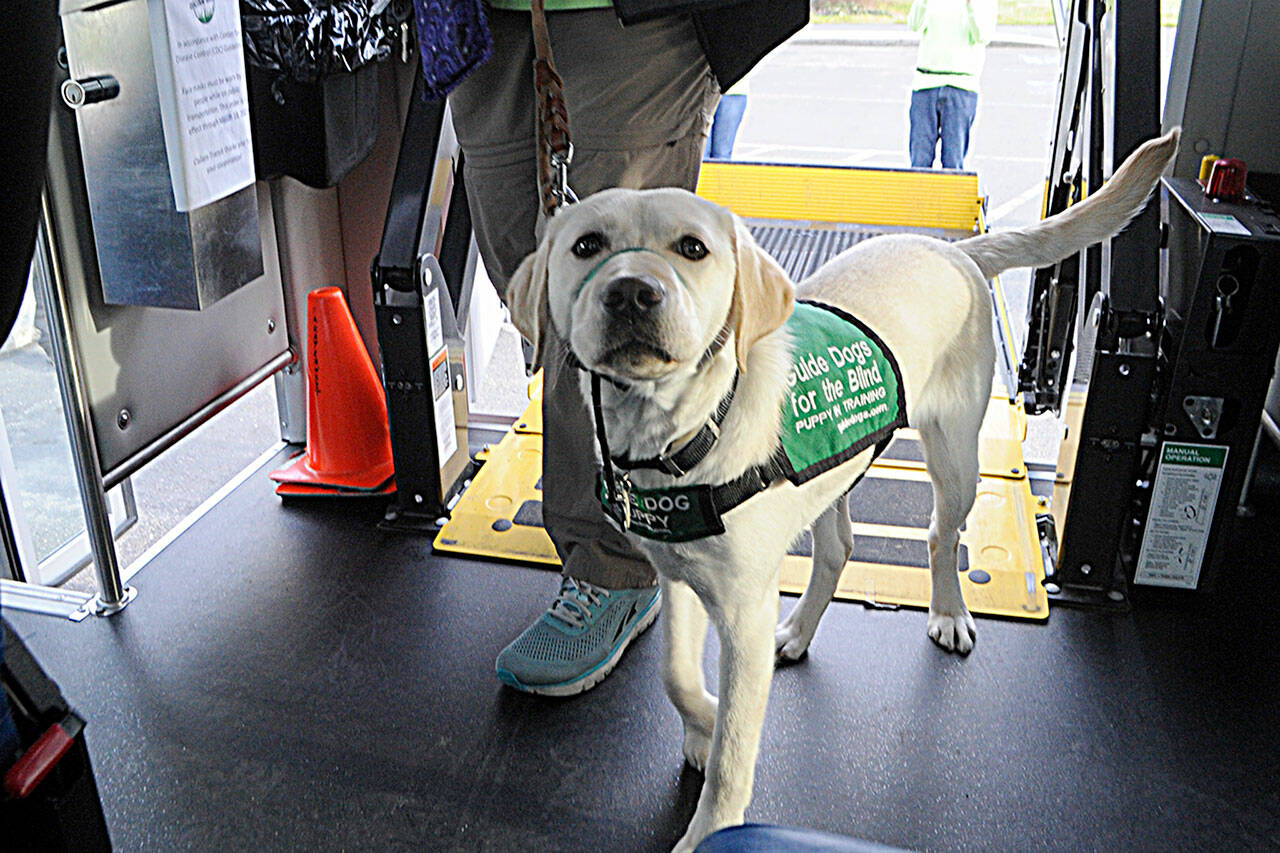Helping with grocery store runs, ferry rides and more, Sequim Puppy Raisers with Guide Dogs for the Blind continue to find new experiences for their dogs to better serve a visually impaired person in their day-to-day activities.
The group’s latest adventure rolled in via Clallam Transit and one of its Paratransit buses.
Driver Jim Paradis brought a Paratransit bus to St. Luke’s Episcopal Church on Thursday, April 14, so four puppies could go up the wheelchair ramp, ride the bus and get a general feel of what their future owners may need.
Scott Gossard, a Clallam Transit supervisor, said they wanted to help, as they have service dogs on fixed routes and Paratransit everyday.
“A lot of visually impaired people use Paratransit and the big buses,” said Deb Cox, Guide Dogs for the Blind organizer.
“This was a good opportunity with the lift component.”
Babs, a 7-and-a-half-month-old lab, was guided by Karen and Jon Tyson, and 6-month-old lab Leora by Kandie and Darrell Whitley. They were the new pups and raisers on the bus.
Cox brought along her 13-month-old lab Vespa, and puppy sitter Barbara Surber escorted Saffi, a 1-year-old lab.
The small group made two treks up and down the ramp and bus stairs before driving to meet Kyle Parrish, a retired transit worker, and his guide dog Brie, across town.
The bus traveled to Walmart and allowed the dogs to get off and back on before going back to Parrish’s home and the church.
The Whitley’s Leora had some nerves going down the steps at Walmart but treats and kind words got her down the stairs with no problems.
All welcome
A little more than a year ago, the Sequim group made a push for new raisers and sitters with much success, Cox said.
“The two newest puppies are being raised by first time sitters,” she said.
Kandi Whitley, a Type-1 diabetic, said she was considering a dog to help alert her about low blood sugars until she saw a flyer for the Guide Dog program. She felt comfortable making the shift as she and her husband felt helping a dog on its journey was something special.
“It’s overwhelming knowing it’s going to help someone,” Kandi Whitley said.
Darrell said the experience has been challenging sometimes.
“(Leora) learns faster than us new trainers,” he joked.
“Thankfully, we have a wonderful group we can learn from and who are willing to help.”
Raisers receive puppies when they’re 8- to 10-weeks old from California and train them for about a year before sending them for further training at the Guide Dogs for the Blind facility in Boring, Ore.
If they pass the four-month, eight-phase program, the dogs can be matched with a visually impaired partner on-site.
Upcoming
In the coming months, Sequim Puppy Raisers will be out and about gaining new experiences while promoting Guide Dogs for the Blind, including trips to Seattle, Port Townsend and Victoria, B.C.
They’ll also be in the Sequim Irrigation Festival’s Grand Parade on May 14, and at the Sequim Farmers and Artisans Market on June 18 and Aug. 6.
Cox said the Sequim Puppy Raisers can always use more volunteers for Guide Dogs for the Blind. This summer marks 15 years for the Sequim club and 80th year for Guide Dogs for the Blind.
The Sequim group meets at 6:30 p.m. the second and fourth Thursday of each month at St. Luke’s Episcopal Church, 525 N. Fifth Ave.
For more about the program, see guidedogs.com/puppy, and facebook.com/GDBSequimpuppyraisers/.


